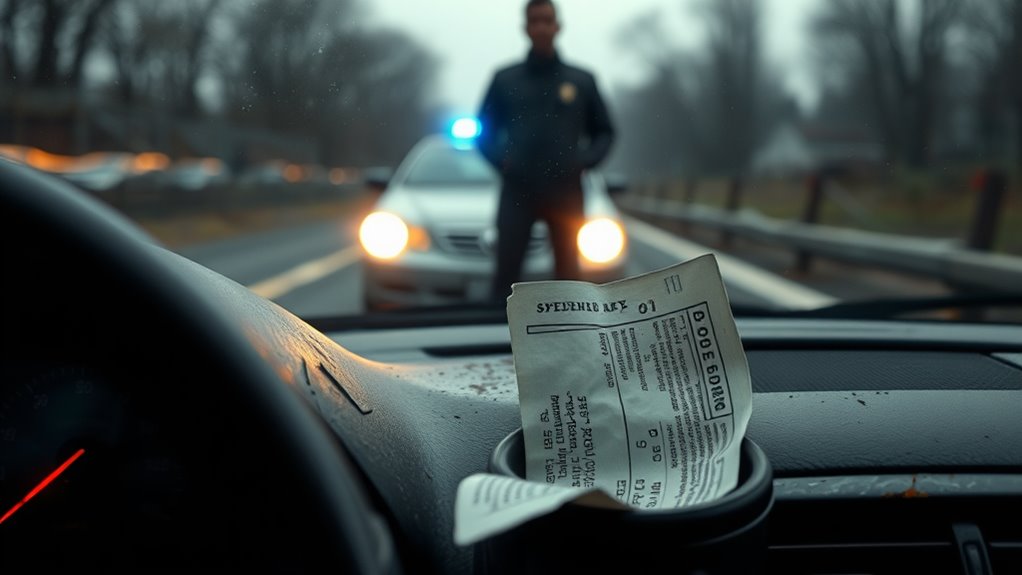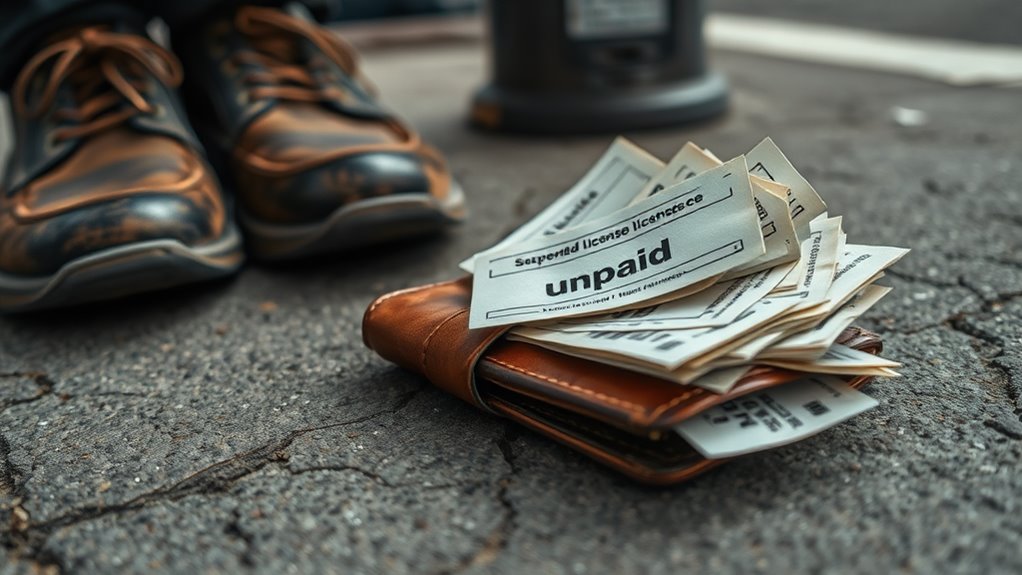
Imagine traversing a maze, each unpaid ticket adding another twist and turn that complicates your path. Unpaid tickets can lead to escalating fines, employment challenges, and even societal consequences that disproportionately affect low-income individuals. The implications stretch beyond finances, touching on mental health and access to essential services. Understanding these risks can reveal how a seemingly minor oversight can spiral into significant life challenges. What do these consequences truly mean for you?
Key Takeaways
- Unpaid tickets can lead to severe financial burdens, escalating from minor fines to substantial debt due to additional fees and surcharges.
- License suspension limits job opportunities, forcing individuals into lower-paying positions and perpetuating cycles of poverty.
- Traffic enforcement often disproportionately affects low-income individuals and minorities, exacerbating social and economic disparities.
- The stress of unpaid tickets and potential legal repercussions can negatively impact mental health, leading to anxiety and emotional distress.
- Limited mobility from license suspension restricts access to healthcare and essential services, further entrenching individuals in a cycle of debt and instability.
Financial Burden of Accumulating Fines and Fees

While you might think of traffic fines as minor inconveniences, they can quickly escalate into significant financial burdens, especially when additional fees and surcharges come into play. A single traffic ticket can balloon from a base fine of $100 to nearly $1,000 due to mandatory fees. Hiring a traffic attorney can help navigate these complexities and potentially reduce penalties.
This growing debt disproportionately impacts low-income individuals, creating a cycle of financial distress. When fines go unpaid, they often lead to further penalties, trapping you in an endless loop of accumulating debt. Fines, fees, and forfeitures generated a combined revenue of $13 billion collected by state and local governments in 2021, highlighting the significant reliance on these financial penalties.
This regressive fine structure exacerbates existing inequalities and threatens economic stability, pushing vulnerable communities deeper into poverty. Reforming these policies to align fines with income could mitigate these burdens and promote greater financial justice in our society.
Employment Challenges Due to License Suspension
Unpaid tickets can lead to severe consequences beyond financial strain, particularly when they result in license suspension. A suspended license can severely limit your job opportunities, as many employers require reliable transportation.
This restriction often forces you into lower-paying positions, perpetuating a cycle of poverty. Insufficient public transportation in many areas exacerbates joblessness, making it even harder to find work.
Additionally, the stress of job insecurity and a suspended license can negatively impact your mental health, leading to anxiety and depression.
The challenges don't just affect your current employment; they can also hinder your long-term career prospects and professional motivation, creating strained workplace relationships and diminishing your overall independence.
Societal Implications of Over-Enforcement
As traffic enforcement increasingly targets minor infractions, communities face significant societal implications that extend beyond individual penalties.
Over-enforcement can exacerbate existing inequalities and undermine community trust. Key issues include:
- Racial and socioeconomic disparities: Minorities often bear the brunt of traffic stops, eroding social cohesion.
- Economic burdens: License suspensions disproportionately affect low-income individuals, perpetuating cycles of poverty.
- Distrust in law enforcement: Residents may avoid cooperation with authorities, fearing unfair treatment.
- Focus on revenue generation: Prioritizing fines diverts attention from serious crimes, compromising public safety.
These implications highlight the urgent need for reforms that address the fairness of enforcement practices to foster trust and equity across communities.
Impact on Mental Health and Wellbeing

The burden of unpaid tickets can considerably impact your mental health and overall wellbeing, leading to heightened stress and anxiety. The financial strain of owed amounts often results in a persistent sense of insecurity, amplifying feelings of despair.
Unpaid tickets can take a toll on mental health, causing stress, anxiety, and a persistent sense of insecurity.
You might experience depression and anxiety, particularly if your license suspension limits your independence and social interactions. This isolation can worsen your mood and motivation, creating a cycle of emotional distress.
Additionally, the stress from potential legal repercussions, like outstanding warrants, can lead to severe anxiety.
It's essential to recognize how these pressures can't only affect your emotional state but also translate into physical health issues, making it imperative to address unpaid tickets before they escalate into more significant problems.
Cycle of Debt and Transportation Limitations
Feelings of stress and anxiety often intensify when faced with unpaid tickets, creating a precarious cycle that can profoundly affect your mobility and financial stability.
Unpaid tickets lead to accumulated debt and, ultimately, license suspension, limiting your ability to work and access essential services. This cycle can manifest in several ways:
- Debt accumulation from penalties and fines.
- Restrictions on mobility hinder job search efforts.
- Difficulty accessing healthcare without reliable transportation.
- Increased financial stress exacerbated by higher unemployment rates.
Breaking this cycle requires addressing the underlying issues, such as reforming debt policies and improving access to public transportation.
Conclusion
In summary, unpaid tickets and the resulting license suspension can trap you in a vicious cycle that's hard to escape. The financial strain weighs heavily, and lost transportation options can limit your job prospects, deepening your struggles. This situation not only affects your wallet but can also take a toll on your mental health. It's essential to address these issues before they snowball, as breaking free from this cycle can lead to better opportunities and a brighter future.


